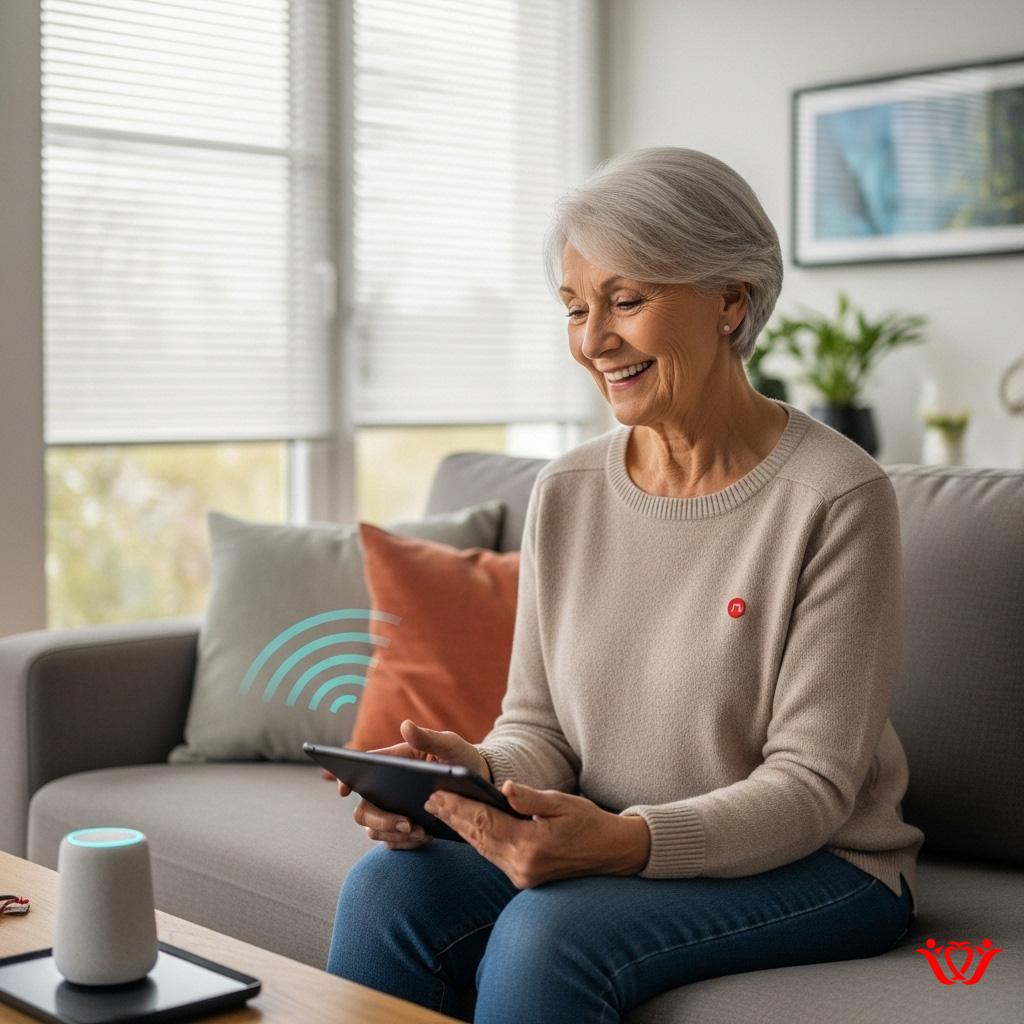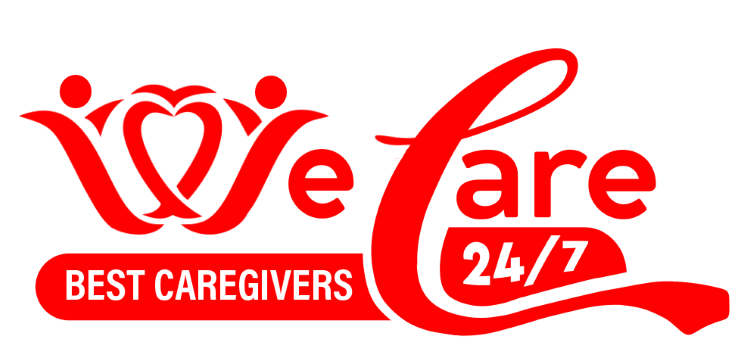Smart Home Modifications for NJ Seniors: Age in Place with Ease

Empowering Independence: Smart Homes for New Jersey Seniors
As we age, the desire to remain independent and comfortable in our own homes becomes more pronounced. For many New Jersey seniors, aging in place isn’t just a preference; it’s a profound goal. Modern technology, particularly smart home modifications, offers innovative ways to achieve this, enhancing safety, convenience, and peace of mind for older adults and their families. At WeCare Home Caregivers, we understand the unique needs of seniors and their caregivers across the Garden State, and we’re here to explore how smart home solutions can make independent living more accessible than ever.
Why Smart Home Technology is a Game-Changer for NJ Seniors
Smart home technology integrates various devices that can be controlled remotely or automatically, often through voice commands or a smartphone app. For seniors, these systems can significantly improve daily life by mitigating common challenges associated with aging.
- Enhanced Safety: Automated lighting prevents falls, smart locks secure homes, and emergency alert systems provide rapid assistance.
- Increased Independence: Voice-activated controls for lights, thermostats, and entertainment reduce the need for physical exertion, allowing seniors more autonomy.
- Improved Convenience: Tasks like adjusting the temperature or checking who’s at the door become simpler and less strenuous.
- Peace of Mind for Families: Adult children, whether living in Bergen County or Burlington County, can remotely monitor their parents’ home environment, ensuring their well-being without being intrusive.
- Support for Caregivers: Smart devices can ease the burden on caregivers, providing assistance with medication reminders, health monitoring, and daily routines.
Key Areas for Smart Home Modifications in New Jersey Homes
Thinking about smart home upgrades can seem overwhelming. It’s helpful to break down potential modifications by the areas of life they impact, focusing on the specific needs of New Jersey seniors.
Safety and Security Enhancements
Safety is often the primary concern for seniors and their families. Smart technology offers robust solutions to create a more secure living environment.
- Smart Lighting Systems: Motion-activated lights in hallways and bathrooms reduce the risk of falls during nighttime excursions. Lights can also be programmed to turn on and off automatically, simulating occupancy when residents are away, deterring potential intruders. Many systems are easily installed in existing light fixtures.
- Smart Locks and Video Doorbells: Keyless entry systems mean no fumbling with keys, and doors can be locked or unlocked remotely. Video doorbells allow seniors to see and speak to visitors without opening the door, enhancing personal security. This is particularly valuable in more densely populated areas of New Jersey, like Newark or Jersey City.
- Emergency Alert Systems: Wearable panic buttons or voice-activated emergency calls connected to a central monitoring service provide immediate help in case of a fall or medical emergency. Some systems integrate directly with local emergency services.
- Smart Smoke and Carbon Monoxide Detectors: These devices not only sound an alarm but can also send alerts to family members’ phones and automatically notify emergency services.
Mobility and Accessibility Solutions
Maintaining ease of movement within the home is paramount for aging in place. Smart devices can bridge gaps in physical accessibility.
- Voice-Activated Assistants: Devices like Amazon Echo or Google Home allow seniors to control lights, thermostats, music, and even make phone calls using only their voice, minimizing the need to move around.
- Automated Blinds and Curtains: For individuals with limited mobility or dexterity, motorized blinds can be controlled via remote, app, or voice command, making it easy to adjust light and privacy.
- Smart Plugs: Convert ordinary lamps and appliances into ‘smart’ ones, allowing them to be turned on or off remotely or on a schedule, which is helpful for managing electronics without reaching for outlets.
Health Monitoring and Management
Technology can play a supportive role in managing health and wellness for New Jersey seniors, providing valuable data and reminders.
- Smart Medicine Dispensers: Programmable dispensers can remind seniors when to take medication and dispense the correct dosage, reducing errors and ensuring adherence to vital regimens. Some can even notify caregivers if a dose is missed.
- Wearable Health Trackers: Devices that monitor heart rate, sleep patterns, and activity levels can provide insights into overall health and detect potential issues early.
- Smart Scales and Blood Pressure Monitors: These devices automatically record readings and can share data with caregivers or healthcare providers, allowing for easier tracking of chronic conditions.
- Fall Detection Technology: Beyond simple alert buttons, advanced systems use sensors to detect falls without requiring the senior to press a button, offering an extra layer of protection.
Comfort and Convenience Upgrades
Beyond safety and health, smart home modifications can simply make daily life more enjoyable and less stressful.
- Smart Thermostats: Devices like Nest or Ecobee learn temperature preferences and adjust settings automatically, or they can be controlled remotely, ensuring the home is always comfortable without manual adjustments. This is especially useful during New Jersey’s varied seasons.
- Smart Appliances: From smart refrigerators that can track grocery needs to smart ovens that can preheat remotely, these appliances add a layer of convenience to kitchen activities.
- Smart Entertainment Systems: Voice-controlled TVs and streaming devices make it easier for seniors to enjoy their favorite shows and movies without navigating complex remotes.
Specific Smart Home Technologies to Consider for New Jersey Seniors
Let’s delve into some specific technologies that offer significant benefits.
Smart Lighting
Philips Hue and Lutron Caséta are popular choices. They offer a range of options from simple smart bulbs to whole-home systems. The ability to program lights to turn on automatically when someone enters a room, or to dim gradually at bedtime, greatly enhances safety and comfort.
Voice Assistants
Amazon Echo and Google Home are powerful tools. They can answer questions, play music, set reminders, make calls, and control a multitude of other smart devices. Their intuitive voice interface makes them highly accessible for seniors who may struggle with small buttons or screens.
Smart Security Systems
Brands like SimpliSafe, Ring, and Arlo offer comprehensive security solutions. These systems can include door/window sensors, motion detectors, and cameras, all manageable from a central app. Many provide professional monitoring services for added reassurance.
Automated Doors and Locks
August Smart Lock allows keyless entry and provides activity logs. For wider accessibility, automatic door openers, often seen in commercial settings, can be installed in homes to assist those using wheelchairs or walkers.
Remote Monitoring and Wearable Tech
Companies like Lively (GreatCall) offer medical alert systems integrated with activity tracking and mobile phones designed for seniors. These devices provide GPS tracking, fall detection, and easy access to emergency services, giving family members peace of mind, whether they’re across town or across the state.
Funding and Resources for Smart Home Modifications in New Jersey
Investing in smart home technology is an investment in long-term independence. Fortunately, New Jersey offers resources that can help offset costs or provide guidance.
- NJ State-Sponsored Programs: The New Jersey Department of Human Services, Division of Aging Services, often has programs or waivers that support aging in place. These may include the Statewide Respite Care Program or certain Medicaid waivers (like the Managed Long Term Services and Supports – MLTSS) that can cover assistive technology or home modifications if deemed medically necessary and part of a care plan. Eligibility varies based on income and need.
- Area Agencies on Aging (AAAs): Every county in New Jersey has an Area Agency on Aging. These agencies are invaluable resources for local information on services, grants, and support for seniors and caregivers. They can help navigate available funding or connect you with programs.
- Veterans Affairs (VA) Benefits: For eligible veterans, the VA offers grants like the Home Improvements and Structural Alterations (HISA) grant, which can cover modifications necessary for accessibility.
- Private Long-Term Care Insurance: Some long-term care insurance policies may cover expenses related to home modifications or assistive technology that supports aging in place. Review your policy details or speak with your provider.
- Tax Deductions: While not direct funding, some medically necessary home modifications may be eligible for a medical expense deduction on federal income taxes. Consult with a tax professional for personalized advice.
Getting Started with Smart Home Upgrades: A Phased Approach
Embarking on smart home modifications doesn’t have to be an all-at-once overhaul. A phased approach can be more manageable and cost-effective.
- Assess Needs: Begin by identifying the most pressing concerns. Is it fall prevention, medication management, or simply convenience? Talk to the senior, family members, and caregivers to prioritize.
- Start Small: Begin with one or two key devices, like smart lighting in high-traffic areas or a voice assistant in the living room. See how they integrate into daily life and how comfortable the senior is using them.
- Professional Consultation & Installation: For more complex systems, or if you’re unsure about setup, consider consulting with a professional smart home integrator. They can design a system tailored to specific needs and ensure proper installation and connectivity. WeCare Home Caregivers can also provide guidance and support in identifying reliable local resources.
- Training and Support: Ensure the senior and their caregivers receive adequate training on how to use new technologies. Ongoing support and troubleshooting are also important to maximize the benefits.
The Broader Impact: Peace of Mind for All
Beyond the tangible benefits of technology, smart home modifications deliver an invaluable commodity: peace of mind. For seniors in Morris County or Cape May County, they offer continued autonomy and the comfort of familiar surroundings. For adult children juggling careers and family, they provide assurance that their parents are safer and more connected. For caregivers, they can alleviate some daily tasks, allowing them to focus more on companionship and personalized care.
WeCare Home Caregivers believes in empowering seniors to live their best lives at home. Integrating smart technology with compassionate, professional in-home care creates a holistic support system that truly champions independence and well-being. By embracing these innovations, we can help New Jersey seniors age in place with dignity, comfort, and remarkable ease.



